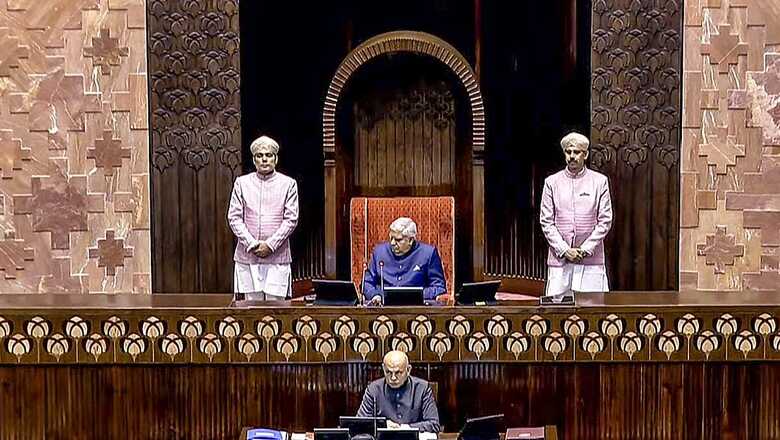
views
Union minister Arjun Ram Meghwal on Tuesday moved the Chief Election Commissioner and Other Election Commissioners (Appointment, Conditions of Service and Term of Office) Bill, 2023, in the Rajya Sabha with amendments. It was later cleared by the House.
The bill aims to regulate the procedure for the transaction of business by the Election Commission as well as the appointment, conditions of service and term of office of the Chief Election Commissioner (CEC) and other Election Commissioners (ECs).
“The Chief Election Commissioner and other Election Commissioners shall be paid a salary which is equal to the salary of a Judge of the Supreme Court,” it also says.
The bill was initially tabled in the Rajya Sabha in August. At that time, the Centre proposed that the salaries, allowances, and other conditions of service of the CEC and ECs would be the same as those of the cabinet secretary.
Meghwal also proposed that no court would entertain any civil or criminal proceedings against current and former CECs and ECs for their decisions during their terms.
“Notwithstanding anything contained in any other law for the time being in force, no court shall entertain or continue any civil or criminal proceedings against any person who is or was a Chief Election Commissioner or an Election Commissioner for any act, thing or word, committed, done or spoken by him when, or in the course of acting or purporting to act in the discharge of his official duty or function,” the legislation says.
Why this protection is crucial
In August, a first information report (FIR) was registered against current Chief Election Commissioner Rajiv Kumar and others in Telangana for allegedly tampering with the poll affidavit of then excise minister V Srinivas Goud.
As per the rules, the statutory role under section 33 of the Representation of the People Act, 1951, empowers returning officers (RO) to accept, process, and decide on nominations to elections.
“The CEC had no role in the discharge of statutory duty regarding affidavits filed by candidates before the RO,” sources said.
The complaint was filed by Raghvendra Raju, a businessman from Mahabubnagar town, against area MLA Goud about the display and removal of various affidavits related to his election in 2018.
“This falls squarely under the jurisdiction of the RO…a special session court for MP/MLA in Nampally, Hyderabad, ordered an investigation by the local police station against the constitutional authority,” sources recalled.
The Telangana High Court placed the special sessions judge under suspension.
“This protection is a landmark decision protecting the election machinery from criminal and civil liability in managing keenly and closely contested elections. This is almost at par with the Judicial Officers Protection Act,” the sources added.
CEC, EC get SC judge status, perks
The amendment also seeks to restore the dearness allowance of the CEC and ECs to that of an SC judge from equivalent to the cabinet secretary as proposed earlier.
The bill also says that the poll body chiefs will be allowed to encash fifty per cent of their earned leave to the credit at the time of the completion of their respective tenures.
The downgrading of the poll body heads was heavily criticised by former CECs and ECs as well as the opposition parties.
The bill, tabled in August, proposed to downgrade the salary and allowances of the CEC and ECs equivalent to that of the cabinet secretary from a Supreme Court judge earlier.
While in terms of amount, both have the same salary but hold different statures in the system. If the CEC and ECs are equivalent to a cabinet secretary, they are ranked below a minister of state. They will be nothing more than bureaucrats, critics said.
There were concerns that this downgrading would not just impact the status of the poll body officials but the status of the Election Commission of India too.
Election commissioners lost job protection
The amendments also proposed that the ECs could be removed from their posts through a letter from the CEC.
Sources said that in the earlier proposed bill, the ECs were protected unlike earlier when they could be removed just by a letter from the CEC or the executive.
“While the CEC can be removed from the post only through impeachment, there is no such protection for the ECs. A simple letter from the CEC could make them lose the position,” sources explained.
The rest of the provisions of the bill remained unchanged.




















Comments
0 comment